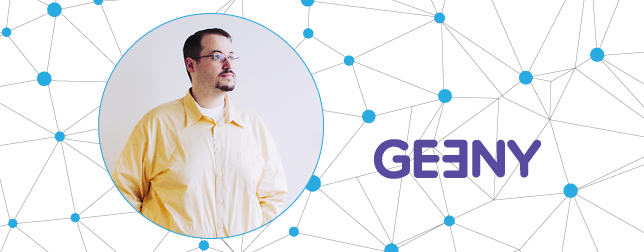Making things smarter and creating a unique consumer experience at the same time is a big challenge for companies these days. But Geeny can help. The fully end to end IoT solution and open ecosystem provides complete technology stack and a strong partner network so you can focus on what you do best. It speeds up IoT development and enables you to build ready-to-market propositions in 100 days.
Telefónica NEXT introduced „Geeny“ at the WT | Wearable Technologies Conference in San Francisco two weeks ago. We interviewed Jeff Katz, CTO of Geeny, to get to know more about this stunning IoT ecosystem and its benefits.
Could you briefly explain what Telefónica Next / Geeny is about?
Geeny is all about empowering consumers in a world where more and more things are becoming connected. We’re building a new kind of IoT Ecosystem that is trying to democratize data: Consumers can see and make use of what data their devices are collecting while developers can mix and match that data to create entirely new value propositions.
How can this help consumers?
Nowadays consumers who want to take advantage of connected devices have to make the choice of which closed ecosystem they are going to buy into. Each device comes with its own connectivity, its own backend, and its own software. They often have their data in the hands of large corporations, where it’s difficult if not impossible to know what exactly is being collected or how it is being used. In contrast, Geeny allows consumers to participate in the value their data is bringing, as they rightfully should. Consumers are always in control of their own data, making Geeny a far more transparent, secure, and private option for them. Additionally, this data can then be leveraged in order to build more customised solutions for consumers. This means that data collected on one day can be analysed and harnessed on the next in order to create tailored solutions.
For example, imagine that the data collected on your Garmin from the run you just went on in preparation for the upcoming marathon is sent directly to your personal trainer, who then gets updated on your progress and immediately adjusts tomorrow’s workout accordingly. While that is going on, your fridge updates your shopping list after your post-run dinner to ensure that you always remain well-nourished while training. Consumers thus become active participants of IoT: this is what Geeny makes possible.
As there are already many IoT platforms out there, can you tell us what makes Geeny stand out in the market?
There are two major differences between Geeny and what’s already out there. Rather than being an end-to-end solution which disappears into the product on the shelf, Geeny is an enabler for different actors to collaborate on solutions. Geeny enables the quick development of solutions and allows developers to focus on their core skill sets. This is because Geeny decouples applications and services from the hardware that supplies their data, allowing businesses on the platform to collaborate with others that may have different areas of expertise.
In short, focus on where you’re good and Geeny will enable the rest: you’re plugged into a global ecosystem of businesses, developers, devices, data, and consumers. Geeny makes it easy for businesses to either make their current IoT solutions smarter, or to build something new from scratch. Barriers to entry are removed and multiple data streams are made available—this allows for even greater value creation for customers.
Can you already reveal some success stories?
As we are still actively developing, the success so far has been in the reception of the idea. We’re just now launching the platform to developers, but already we’ve had some amazing discussions with businesses, developers, and partners. We hear that our ecosystem concept is definitely the right one, and already we are able to make strong partnerships with other companies that see the future as we do.
What is your favourite wearable device and why?
It’s quite difficult to narrow it to one, so I will have to answer with two: I quite like Pavlok for the sheer absurdity. Basslet is almost magical in how it transforms portable music listening.
The growth in popularity of wearable devices like these is obvious but this is just the beginning. Here you can find a short interview with Jeff:









